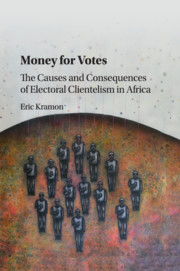1 - Introduction
from Part I - The Puzzle of Electoral Clientelism
Published online by Cambridge University Press: 26 October 2017
Summary
Prior to Kenya's March 2013 elections, the country's Human Rights Commission released footage of a secretly videotaped campaign event. The video features Ferdinand Waititu—a now-former member of parliament from Nairobi's Embakasi Constituency—speaking to voters at a campaign rally in the city's Donholm neighborhood. Waititu delivers a passionate speech in which he promises that he will bring jobs, help women and youth, and improve food security. After the address, he personally distributes money to members of the audience.
Many observers would call this “vote buying”: an attempt to directly exchange money for votes. This book shows that this is often amischaracterization. A central theme is that gift giving is often not a strategy to buy votes, but instead a mechanism through which politicians convey information to voters. According to the informational theory I advance, politicians such as Waititu distribute handouts to make their promises to deliver development resources and particularistic benefits to the communities that they representmore credible and, as a result, to connect with and persuade poor voters. Thus, what observers often interpret as “vote buying” is actually not a transaction at all.
In developing and testing this argument, this book contributes to the literature on electoral clientelism—the allocation of private and material benefits to voters during elections (Gans Morse et al., 2014). Electoral clientelism has been widespread in a range of contexts, including the late Roman Republic (Lintott, 1990; Yakobson, 1995) and elections in eighteenth- and nineteenth-century Britain and the United States (Bensel, 2004; O'Leary, 1962). In contemporary Latin America, electoral clientelism is prevalent in Argentina (Auyero, 2001; Brusco et al., 2004), Mexico (Magaloni, 2006), and Nicaragua (Gonzalez-Ocantos et al., 2012). In the Middle East, the strategy is important to elections in Egypt (Blaydes, 2010), Jordan (Lust-Okar, 2006), and Lebanon (Corstange, 2010). In Asia, electoral clientelism is pervasive in such countries as the Philippines (Khemani, 2012) and Taiwan (Wang and Kurzman, 2007). Electoral clientelism is common to election campaigns in much of Africa.1 In Ghana, for example, “campaigning is often about walking around various neighborhoods, talking to people about what they do and what their life is, while one of ‘the boys’ … continues to feed the MP with small notes for handouts from a small envelope” (Lindberg, 2003, p. 129).
- Type
- Chapter
- Information
- Money for VotesThe Causes and Consequences of Electoral Clientelism in Africa, pp. 3 - 31Publisher: Cambridge University PressPrint publication year: 2017

